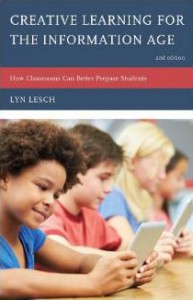 Creative Learning for the Information Age: How Classrooms Can Better Prepare Students, second edition examines how students in their formative years can learn in a more creative manner and can become successful in an age in which knowledge travels so rapidly and is transformed so quickly. This book sets forth several solutions, such as new skills that allow students to perceive important relationships and connections within various subject matters, a different type of accountability that is integrally tied to student initiative, and a different learning structure that allows teacher and student to work together to develop subject matter which is more fully connected to the world of professional expertise.
Creative Learning for the Information Age: How Classrooms Can Better Prepare Students, second edition examines how students in their formative years can learn in a more creative manner and can become successful in an age in which knowledge travels so rapidly and is transformed so quickly. This book sets forth several solutions, such as new skills that allow students to perceive important relationships and connections within various subject matters, a different type of accountability that is integrally tied to student initiative, and a different learning structure that allows teacher and student to work together to develop subject matter which is more fully connected to the world of professional expertise.
Lyn Lesch also assesses certain barriers which may stand in the way of students learning more creatively in our current information age. In particular, he draws attention to an emphasis on standardized testing and the introduction of national core standards—both of which significantlyrestrict the field of various subject matters and thereby restrict creative thinking and learning—and the potential dulling of young people’s inner lives along with a potentially distracted awareness being engendered in them by the technologies of our current digital age.
“Before we can ever hope to reimagine education for a changing world, we need to know what questions we should be asking. Lyn Lesch knows what those questions are, and Creative Learning for the Information Age is where he gathers together the answers for the rest of us. It’s a personal, eclectic, insightful examination of how adults can best support the holistic learning and growth of young people. If you care about the future of education, I urge you to read this book.”
– Sam Chaltain, author of Our School: Searching for Community in the Era of Choice
“An experienced school leader, Lyn Lesch has written a very thoughtful exploration of a much more creative approach to learning. The world needs more educators like him.”
– Tony Wagner, Ed.D., Harvard University Innovation Lab and author of Creating Innovators: The Making of Young People Who Will Change the World
“In this era of extremely rapid change, education policy-making has been primarily reactionary. Lyn Lesch looks at the world as it is and is becoming and explores the potentially negative implications of unnecessarily restrictive predetermined curricula and core standards.”
– Marion Brady, author of What’s Worth Teaching: Selecting, Organizing, and Integrating Knowledge